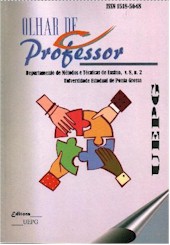Os programas de recuperação paralela e a qualidade da educação em São Paulo
Conteúdo do artigo principal
Resumo
pública estadual paulista, em 1997, a reprovação foi abolida para garantir maior permanência
dos alunos na escola. Sem a reprovação, os programas de recuperação paralela da
aprendizagem foram elevados a elemento essencial para a garantia da qualidade do
ensino e para evitar a promoção automática. Partindo dessa importância atribuída aos
programas de recuperação paralela dos alunos, buscamos, no presente texto, analisar a
estrutura e o funcionamento desses programas, bem como investigar as suas contribuições
para a qualidade do ensino paulista. Para desenvolver essa pesquisa, foram utilizados
os pressupostos teóricos da pedagogia crítico-social dos conteúdos e coleta de
dados por meio de entrevistas com professores coordenadores pedagógicos, entrevista
coletiva com professores das classes de recuperação paralela e observações em salas de
aulas de 17 escolas estaduais. A análise realizada revelou-nos as principais dificuldades
enfrentadas pela escola organizada em ciclos e sem reprovação.
Downloads
Detalhes do artigo
Autores que publicam nesta revista concordam com os seguintes termos:
a) Os autores mantêm os direitos autorais e concedem à revista o direito de primeira publicação, com o trabalho simultaneamente licenciado sob a Creative Commons Attribution License Atribuição 4.0 Internacional (CC BY 4.0) que permite o compartilhamento do trabalho com reconhecimento da sua autoria e publicação inicial nesta revista.
b) Os autores são autorizados a assinarem contratos adicionais, separadamente, para distribuição não exclusiva da versão publicada nesta revista (por exemplo, em repositórios institucionais ou capítulos de livros), com reconhecimento da sua autoria e publicação inicial nesta revista).
c) Os autores são estimulados a publicar e distribuir a versão onlline do artigo (por exemplo, em repositórios institucionais ou em sua página pessoal), considerando que isso pode gerar alterações produtivas, bem como aumentar o impacto e as citações do artigo publicado.
d) Esta revista proporciona acesso público a todo o seu conteúdo, uma vez que isso permite uma maior visibilidade e alcance dos artigos e resenhas publicados. Para maiores informações sobre esta abordagem, visite Public Knowledge Project, projeto que desenvolveu este sistema para melhorar a qualidade acadêmica e pública da pesquisa, distribuindo o OJS assim como outros softwares de apoio ao sistema de publicação de acesso público a fontes acadêmicas.
e) Os nomes e endereços de e-mail neste site serão usados exclusivamente para os propósitos da revista, não estando disponíveis para outros fins.
______________

Este obra está licenciado com uma Licença Creative Commons Atribuição 4.0 Internacional.

